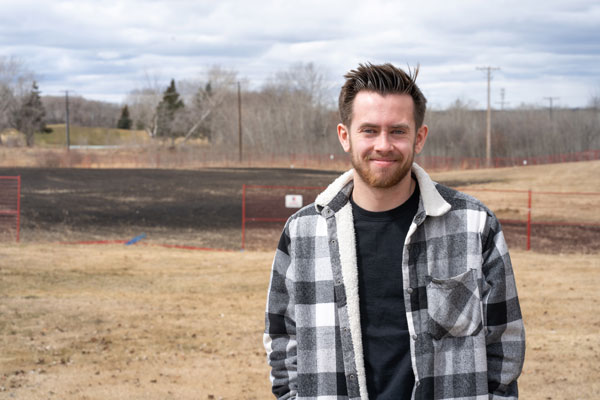
A Prince Albert Sask Polytech campus student hopes to generate some buzz with a pollinator garden project in the city.
Tucker James is using hands-on learning and applied research by creating a pollinator garden as part of the Integrated Resource Management diploma program at Saskatchewan Polytechnic. James came up with the idea while working at the Prince Albert National Park over two summers. The project is a requirement for graduation, and must receive approval from an instructor who oversees it.
“I was working for Parks Canada on the resource conservation team,” James explained. “We were building some pollinator gardens for the park in order to boost biodiversity and make people aware of the role of native plants in an ecosystem.
“That was how I got the idea for it. I put the idea forward to my plant taxonomy teacher Joanne Marchand, and she agreed to be my project supervisor.”
James then met with the City of Prince Albert and they agreed to help. He also received permission to use garden space from the Prince Albert Food Bank. The Food Bank has public garden plots by Holy Cross School at the corner of 15th Avenue and 15th Street.
“It’s planted like a regular garden, like people have in their yards or a fence to be a display, but it utilizes entirely native species that are found within Saskatchewan that grow in the wild here,” James explained. “(It’s) mostly prairie plants, mostly from like south of the boreal forest and it’s kind of meant to be a supplement for biodiversity.”
The garden provides habitat and food for pollinators like bees, butterflies and hummingbirds
“They’re important to the ecosystem, and by putting all these flowers out for them, it’s providing a food source and other benefits to them. It’s also a way to kind of make people aware of what species are local to Saskatchewan and how exposed and grow well in gardens,” James said.
“It’s a really nice way to combine conservation with a hobby that a lot of people do.”
James initially planted the flowers in his garage in March to get a jump on the growing season. Starting them indoors meant the outdoor garden began with bigger plants.
James had to “cold stratify” the seeds by storing them in a damp environment in the fridge for six weeks. This mimics the early spring conditions, and lets them know it’s time to start growing.
“When we plant them they’ll grow faster and hopefully flower sooner,” he explained.
James plans to further his education at the University of Regina, majoring in environmental biology. An agreement between the post-secondary institutions allows graduates of Sask Polytech’s two-year Integrated Resource Management diploma program to transfer into the third year of the University of Regina’s four-year environmental biology degree to continue their education.
He explained that he wanted to do something in a field that focused on plants, but he wants to see where his education can take him.
“What I’m really interested in is our plant communities in Saskatchewan,” he explained. “Prairie plants really interest me, and so this is a really good hands-on way to learn about what kind of plants we have in the province, (and) what ecological role they fulfill, and just learn more about botany and plant taxonomy in a really cool hands-on way.”
James said he may specialize in plants, but he is interested in every facet of biology.
He also thanked his project advisor Joanne Marchand, Tim Yeaman and the City of Prince Albert,
Kim Scruby and the Prince Albert Food Bank, Chet Neufeld and the Native Plant Society of Saskatchewan for donating seeds, Lisa and Renny Grilz from Blazing Start for providing seeds and seedlings and Louise Hudon for providing milkweed plants.
michael.oleksyn@paherald.sk.ca

